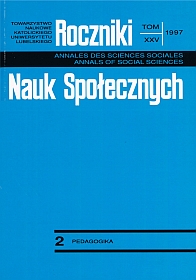Personalistyczna koncepcja szkoły i dydaktyki
Abstrakt
The paper deals with the question of the personalistic conception of didactics and school, a conception which is arousing ever more interest with both theoreticians and practitioners. Having defined briefly the very personalism, the paper goes on to present the main assumptions of the personalistic school and didactics, and the purpose of the present paper. The purpose being not so much showing some concrete solutions, but giving only criteria of didactic thinking and acting. According to the character of didactics in personalism, it is rather a criteriology in reference to the work and tasks of school.
Now translating the above assumptions into the didactic and school problems, the paper outlines the conception of school and a didactic activity which is being pursued in it. We find here also essential aspects of a knowledge about this activity (it is didactics. The paper points at the basic aspects of the latter’s interests and tasks as regarded within a broader context of aims and tasks that the school has, ranging from the so-called perennial personalism (St. Augustine and St. Thomas Acquinas) to the personalism of our times (from E. Mounier).
Stressing the fact that man is person, the personalistic conception of school and didactics is very close to and often mistaken with the popular conception of active teaching and the socalled new schools that have been popular since the beginning of the 19th century. E. Claparéde and C. Frainet are regarded as the main representatives of the new schools. Comparison and polemic with some contemporary proposals and standpoints adopted by the new schools and active teaching allow us to form an opinion about the specific character of the personalistic conception of didactics and school. It may also be helpful in shaping a sensitivity and mentality necessary for the practical work and theoretical reflection in education.
Copyright (c) 1997 Roczniki Nauk Społecznych

Utwór dostępny jest na licencji Creative Commons Uznanie autorstwa – Użycie niekomercyjne – Bez utworów zależnych 4.0 Międzynarodowe.


